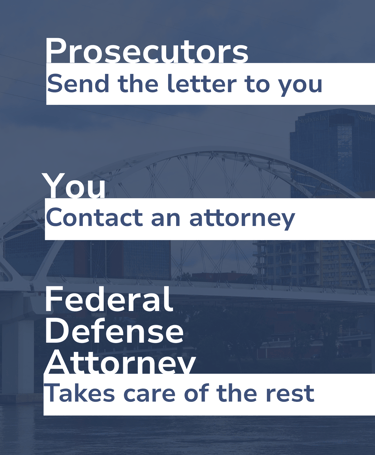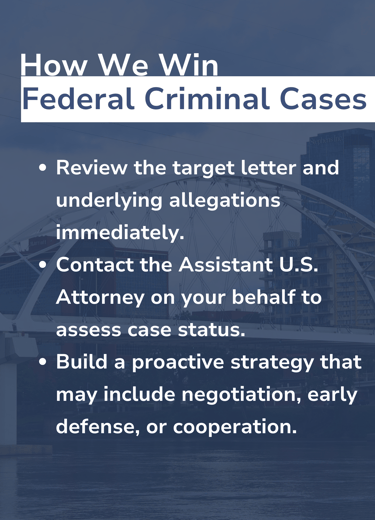What Is a FBI Target Letter, and What to Do If You Receive One in Arkansas?
Got an FBI target letter? Learn what it means, what steps to take, and how a federal criminal defense lawyer can help you avoid arrest or indictment. Call Ludwig Law Firm today at 501-838-4043 for your free consultation.
FEDERAL CRIMINAL DEFENSE


FBI Targeting Letters in Arkansas
The way we see it, there are two ways to look at a target letter
First way? A serious threat to your future.
A targeting letter is essentially the government saying to you “Hey! Just so you know, we’re going to be pressing federal charges against a group that you were a part of. Annnnnd, you might be a part of a federal criminal investigation. BTW, you should give us a call soon to talk details. Hope you have a nice day!”
Second way? An opportunity for a federal criminal defense attorney to change the government’s perception of you and clear your involvement.
At Ludwig Law Firm, we’ve handled several federal cases, and we know that a targeting letter has some hidden meaning. For example, they sometimes conclude with a request to contact federal prosecutors. That is NOT a command for you to come quietly. It's a nudge to contact a criminal defense law firm, and have THEM contact the feds for you. You still have a right to an attorney.
If you get in touch with us, we’ll find out:
What Is this Investigation About?
Can Criminal Charges Be Avoided?
How Much Time Is There Left to Avoid Charges and Resolve Things?
Who at Ludwig Law Firm Will Represent Me?
Has My Ludwig Law Firm Attorney Resolved FBI Target Letters Without Jail or Charges for Clients in the Past?
What Is The Most Important Thing to Keep In Mind When Receiving a Targeting Letter in Arkansas?
The most important thing to keep in mind when receiving such a letter is that:
Federal prosecutors send the letter to offer a chance to cooperate.
You DONT contact them. You, the recipient, have legal rights and choices that could shape the entire case.
Federal Defense attorneys should be your first call. Contact them, and let them give make that call to the feds.
And we’re here to tell you that nobody knows the Eastern Arkansas Courthouse better than a Ludwig attorney. Let us make the call.


Am I In Trouble When I Receive A Target Letter?
One important concept to understand is the difference between a target letter and a search warrant.
If you are receiving a target letter, the investigation you are a part of is likely in the early stages, one that has not been reviewed by a court. Why? Because investigators must have probable cause to issue a search warrant and take next steps (such as arresting someone in their own home), and in a federal case, this must be secured by a federal magistrate judge. No federal magistrate judge? Likely no court involvement yet.
That means the government doesn’t necessarily perceive you as a threat yet. You’re in a gray area where the government is intending to charge you, but they are not taking action on this intention. And this, my friend, is where we come in.


Proven Defense Strategies Against Target Letters in Arkansas
At Ludwig Law Firm, we’ve helped clients navigate serious federal investigations with clarity, and our first task is always to actively influence the government’s perception of you. We want to prove that you:
Didn’t willfully break the law
Didn’t knowingly help someone else break the law
If you don’t call an attorney and address the above concerns, the investigation will quickly turn into formal charges, also known as an indictment, which will be in front of a federal grand jury. Not a place where you want to be.
To avoid this, here’s how we help improve the government’s perception of you:
Review the target letter and underlying allegations immediately.
Contact the Assistant U.S. Attorney on your behalf to assess case status.
Build a proactive strategy that may include negotiation, early defense, or cooperation.


Results of a Strong Federal Criminal Defense in Arkansas
No Arrest After FBI Target Letter
Once a respected attorney notifies the government that you are being represented, agents will typically back off. You won’t have to fear being arrested in front of your kids, your boss, or your church family.
No Indictment If Resolved Early
A skilled defense attorney can negotiate a plea deal that resolves the case without having to go through a grand jury. This protects you from public indictment and may lead to an early favorable outcome.
No Charges Filed
By use of evidence such as texts, emails, documents, and consultants, a skilled defense attorney can build your case, shift the focus to another party, and potentially persuade federal prosecutors to drop the investigation early.
No Conspiracy Charges
Federal prosecutors often file conspiracy charges that hold you accountable for actions taken by co-defendants—even if your role was minimal. Early legal intervention can isolate you from a conspiracy, significantly reducing your exposure to serious penalties. Common federal conspiracy charges include:
Conspiracy to Distribute Controlled Substances (21 U.S.C. 841; 846)
Conspiracy to Commit Money Laundering (18 U.S.C. 1956; 371)
Conspiracy to Commit Mail/Wire Fraud (18 U.S.C. 1341; 1343; 371)
Conspiracy to Commit Bank or Tax Fraud
Conspiracy in Healthcare Cases (Medicare, Medicaid, kickbacks, etc.)
Conspiracy to Commit Securities or Identity Fraud
Conspiracy to Commit Bribery or Obstruction of Justice
Getting ahead of these charges with experienced legal counsel is key to avoiding serious federal penalties.


Why Choose Ludwig as your Federal Criminal Defense Attorney in Arkansas?
We have yielded positive results for several federal cases in Arkansas, and are actively working on federal cases in 2025. You will never receive service from a junior attorney or a paralegal on your case, but will only get help from Kale Ludwig, Kyle Ludwig, or Superlayers rising star and business partner Harry Warden on your case.
If you’ve been arrested, don’t wait to act. Contact Ludwig Law Firm's Arkansas criminal defense attorneys at 501-838-4043 or visit our federal criminal defense page for your free consultation.
📍 Proudly serving clients across Arkansas, including Little Rock, Conway, and Pine Bluff.
Frequently Asked Questions
Q: Do I have to respond to a federal target letter?
A: No, but you should immediately consult a defense attorney before making any decisions.
Q: Can I avoid prosecution if I cooperate?
A: Possibly—but cooperation doesn’t guarantee immunity. Your lawyer can assess the risk.
Q: Is a target letter the same as a subpoena?
A: No. A subpoena compels evidence or testimony. A target letter is a formal warning.
Q: Can I go to jail after receiving a target letter?
A: Not immediately, but it often signals that charges are coming.




